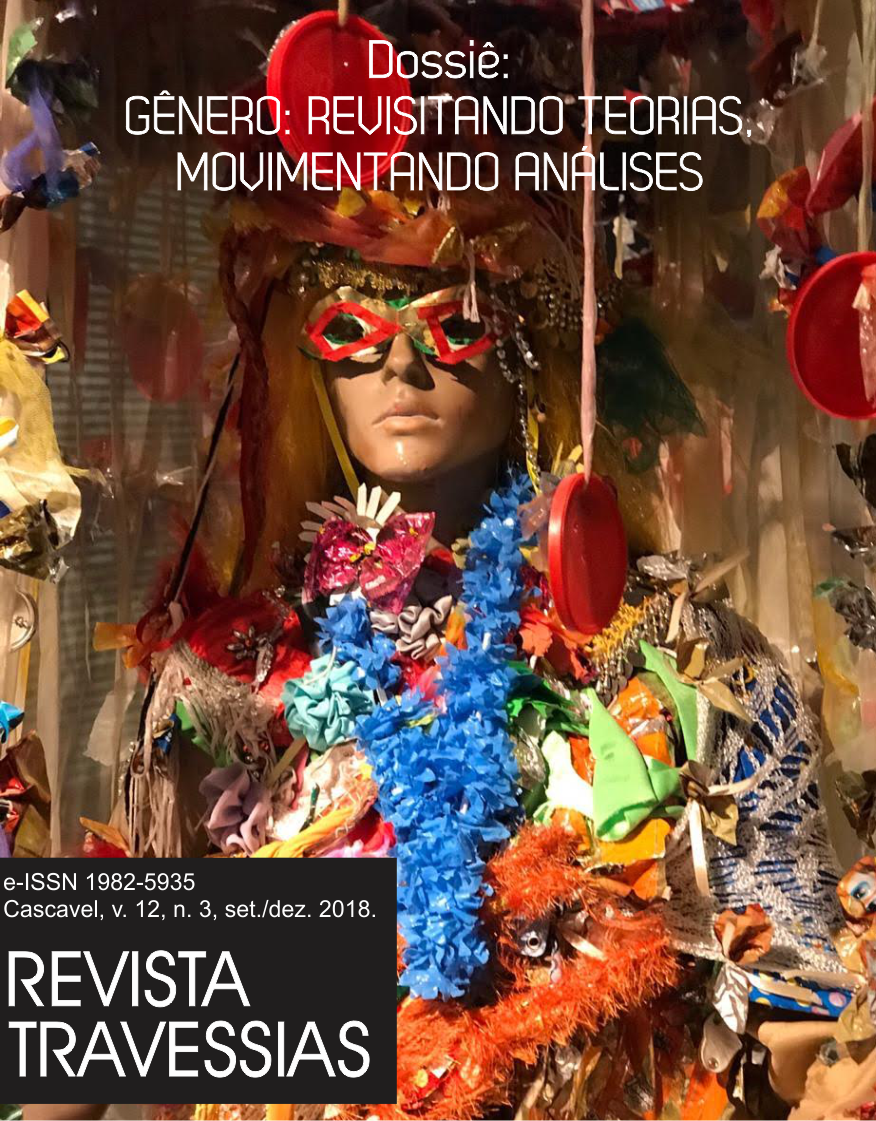Unarchived women: testimony, violence and female condition in Our lady of the Nile, from Scholastique Mukasonga
Keywords:
Gender studies, Memory, French Language literature, Ruanda Genocide, Scholastique Mukasonga.Abstract
The lyceum Our Lady of the Nile prepares the female elite from Ruanda to take over their roles at society. The discursive, ideological and cultural disputes reveal oppressive power relations, in which the Tutsi quota holder minority is constantly humiliated by their Hutus colleagues. In a country known by its violence and by its racial-ethnical differences, Scholastique Mukasonga intends to give voice to the memory so far obliterated by the genocidal practices. By unveiling the female students’ day-by-day, the author constructs a narrative that shows the private environment as a reflex of the excluding society. The testimonial content in the work discloses these female bodies in order to reveal another experience, different from the one contemplated in the official memory re-elaboration processes. A mosaic of voices, also polyphonic and plural, problematizes themes such as virginity, femininity, violence, rape, sexual abuse and power relations that are permeated as well by race and class issues. The objective of this study is to critically analyze the book Our Lady of the Nile (2017), from Scholastique Mukasonga, in order to evidence the female condition in the work. The investigational process shall be conducted under the gender and memory studies. For such, the following authors shall be used as theoretical background: Bernard Bruneteau (2006), Catherine Coquio (2004), Geoffrey Hartman (2000), Hélène Piralian (2000), Mahmood Mamdani (2001), Michelle Perrot (2003; 2017), Rebecca Solnit (2017).
Downloads
References
BRUNETEAU, Bernard. El etnicismo genocida posterior a la guerra fría y el nacimiento de una jurisdicción interacional permanente. In: BRUNETEAU, Bernard. El siglo de los genocídios. Tradução de Florencia P. Tubert e Hugo G. Fernández. Madri: Alianza Editorial, 2006. p. 227-240
CARNEIRO, Sueli. Enegrecer o feminismo: a situação da mulher negra na América Latina a partir de uma perspectiva de gênero. In.: Ashoka Empreendimentos Sociais; Takano Cidadania (Orgs.). Racismos contemporâneos. Rio de Janeiro: Takano Editora, 2003, p. 49-58.
CHRÉTIEN, Jean-Pierre. Un <> au Rwanda? Image ou logique d’un génocide. Vingtiène siècle. Revue d’histoire, nº 48, out. 1995, p. 131-142.
COQUIO, Catherine. Le réel et les récits. Paris: Belin, 2004.
GROSZ, Elizabeth. Corpos Reconfigurados. Trad. Cecilia Holtermann. Cadernos Pagu, Campinas, n. 14, p. 45-86, jan-jun 2000. Disponível em: https://periodicos.sbu.unicamp.br/ojs/index.php/cadpagu/article/view/8635340 Acesso em: 31 ago. 2017.
HARTMAN, Geoffrey H. Holocausto, testemunho, arte e trauma. Tradução de Cláudia Valladão Mattos. In: NESTROVISK, Arthur; SELIGMANN-SILVIA, Márcio. Catástrofe e Representação. São Paulo: Escuta, 2000. p. 207-235.
HATZFELD, Jean. Uma temporada de facões. Tradução de Rosa Freire d`Aguiar. São Paulo: Companhia das letras, 2005.
JÉRONIMO. Miguel Bandeira. Revisitando os lutos inacabados do império. In: RIBEIRO, António Sousa; RIBEIRO, Margarida Calafate. Geometrias da memória: configurações pós-coloniais. Porto: Edições Afrontamento, 2016. p. 61-94
LOURO, Guacira Lopes. Pedagogias da Sexualidade. In: LOURO, Guacira Lopes. (Org.). O corpo educado: Pedagogias da sexualidade. Belo Horizonte: Autêntica Editora, 2010, p. 7-34.
MAMDANI. Mahmood. When victmis become killers: Colonialismo, Nativism and Genocide in Rwanda. New Jersey: Princeton University Press, 2001.
MUKASONGA, Scholastique. Baratas. Tradução de Elisa Nazarian. São Paulo: Nós, 2018.
MUKASONGA, Scholastique. Nossa senhora do Nilo. Tradução de Marília Garcia. São Paulo: Nós, 2017.
NICHANIAN, Marc. The historiografic perversion. Tradução de Gil Anidjar. New York: Columbia University Press, 2009.
PERROT, Michelle. Minha história das mulheres. Tradução de Ângela M. S. Côrrea. São Paulo: Contexto, 2017.
PERROT, Michelle. Os silêncios do corpo da mulher. Tradução de Luiz Antônio Oliveira de Araújo. In: MATOS, Maria Izilda Santos de; SOIHET, Rachel (orgs). O corpo feminino em debate. São Paulo: Editora da Unesp, 2003. pp. 13-28.
PIRALIAN, Hélène. Genocidio y transmisión. Tradução de Horacio Pons. Buenos Aires: Fundo de Cultura Económica de Argentina, 2000.
SELIGMANN-SILVA, Márcio. Narrar o trauma: A questão dos testemunhos de Catástrofes históricas”. Psicologia Clínica, Rio de Janeiro, v. 20, n.1, 2008, p. 65-82. Disponível em: http://www.scielo.br/pdf/pc/v20n1/05 . Acesso em 02 abr. 2018.
SOLNIT, Rebecca. A mãe de todas as perguntas: reflexões sobre os novos feminismos. Tradução de Denise Bottmann. São Paulo: Companhia das letras, 2017.
Downloads
Published
How to Cite
Issue
Section
License
Creative Copyright Notice
Policy for Free Access Journals
Authors who publish in this journal agree to the following terms:
1. Authors keep the copyright and grant the journal the right of first publication, with the work simultaneously licensed under the Creative Commons Attribution License, which allows sharing the trial with acknowledgment of authorship and initial publication in this journal.
2. Authors are authorized to take additional contracts separately, for non-exclusive distribution of the work version, published in this journal (eg publish in institutional repository or as a book chapter), with acknowledgment of authorship and initial publication in this journal.
3. Authors are allowed and encouraged to publish and distribute their work online (eg in institutional repositories or on their personal page) at any point before or during the editorial process, as this can generate productive changes, as well as increase both impact and citation of the published trial (See The Effect of Free Access).
Creative Commons License
This work is licensed under a Creative Commons Attribution–NonCommercial-shareaswell 4.0 International License, which allows you to share, copy, distribute, display, reproduce, completely or part of the work, since there is no commercial purpose, and authors and source are cited.



